#the stereotypes the stigma etc. etc.
Note
do you have any particular thoughts regarding marcille being a half-elf? its interesting to me considering the fact that she seems self-conscious about being a half-elf, but denies it when its brought up
i remember marcille looking visibly uncomfortable over laios simply asking her how old she is, which i think the only reason she might feel nervous about this is because it might reveal her as a half-elf to him.
she's never corrected anybody whose called her an elf either.
never mind the circumstances of the reveal, in which thistle goes on about how half-elves are inferior and accusing her of wanting to become full blooded elf, she seemed particularly upset like he struck a nerve-
i wish the half-elf thing was built upon more. also, underrated marcille line:
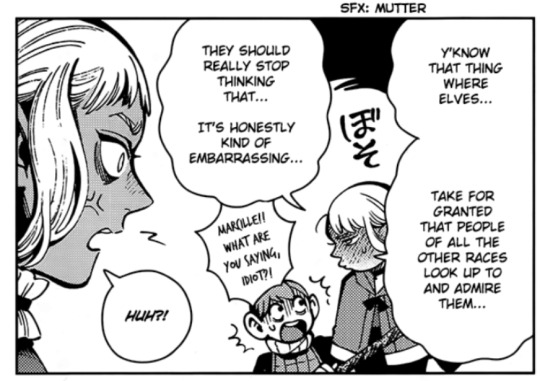
okay so i revisited this sequence just to make sure I could back myself up and it's just... man. there's a lot going on.
the first reaction we get from Marcille is this huge panel that takes up half of the page
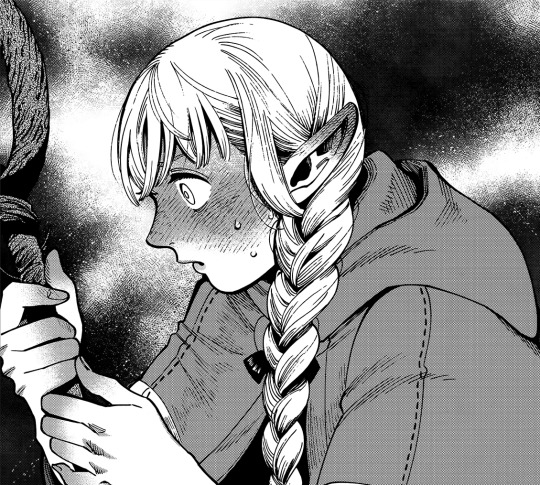
she is viscerally affected. flushing to the tips of her ears with the intensity of it. and we see it again, a few pages later
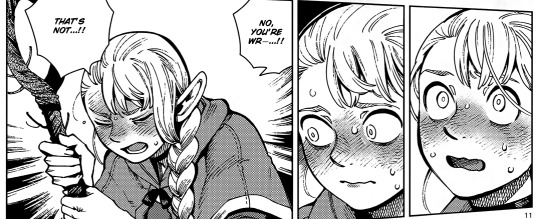
so it might seem like she's embarrassed about it and lying to herself, but... I really think it's just that Thistle is accidentally hitting sore spots. If you really look at what he says to get these reactions
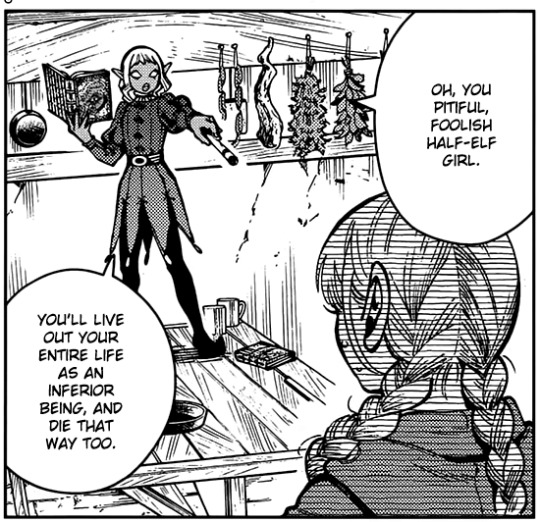
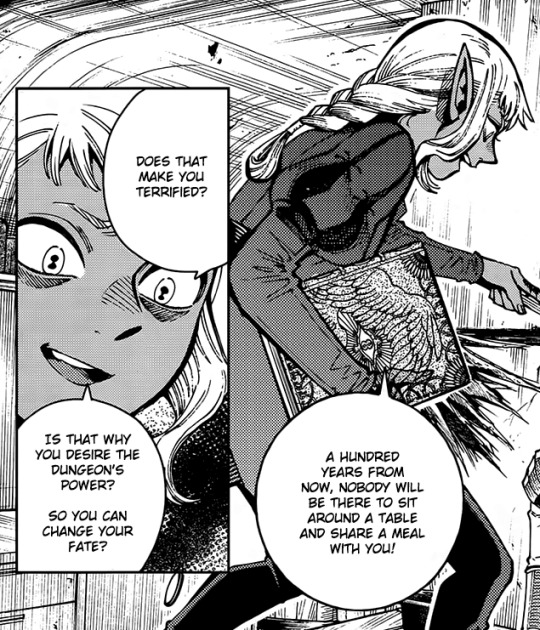
"you'll live out your entire life [...] and die that way too"
"a hundred years from now, nobody will be there"
Hear me out. I think, if he stuck to harping on about her inferiority without bringing up how terrifyingly long-lived she is, she wouldn't have been as bothered. But right now, Thistle is accidentally hitting all the marks on Marcille's deepest fears-- and this is after the Winged Lion promised her that her dreams could come true in an extremely vulnerable moment, so it also hits her slightly guilty conscience as well.
I do truly believe that Marcille isn't bothered about being a half-elf the way that people assume she'd be bothered by it. To her, the biggest problem with being a half-elf is that it's isolating.
On one hand, it's not hard to imagine why she'd distance herself from elves in the west. A lot of them can clock her as a half-elf on sight, unlike other races, and therefore she's always branded with this weird stigma of being Othered -- I would even say that she considers herself lucky for being born outside of elven culture instead of having to grow up in it. I mean, just... look at the way elves talk about her.
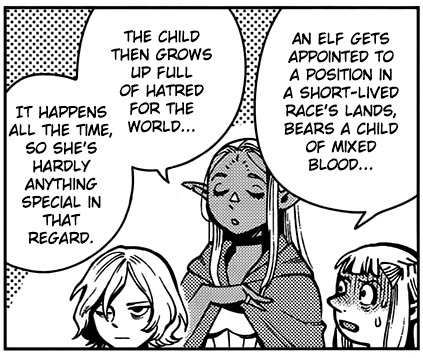

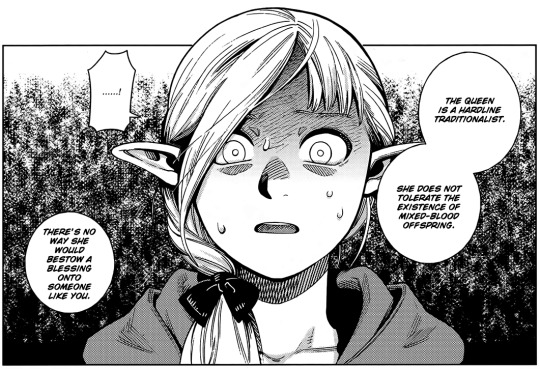
Skipping past the uncomfortable implication of what 'not tolerating the existence' of half-elves would actually entail, this is incredibly fucking annoying. You can see why she wouldn't want to be around elves much. You see a lot of Marcille reacting badly here, but honestly, almost all of it can be attributed to her freaking out that her bluff completely failed. She's honestly more paying attention to Izutsumi's footsteps and trying to coordinate an opportunity to escape.
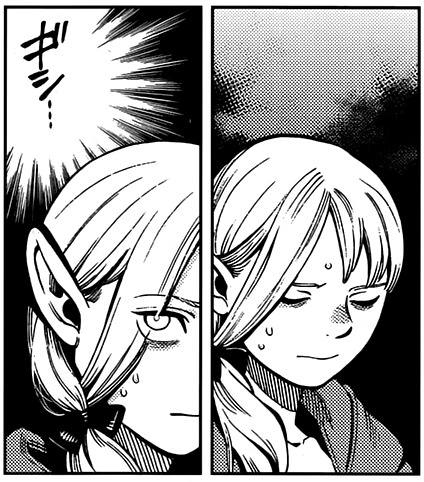
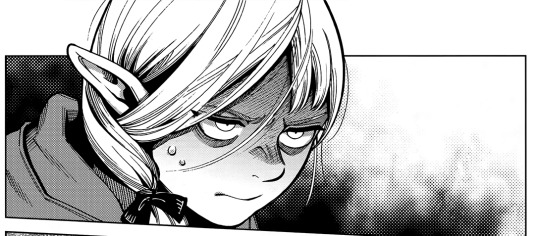
And in the end, you see her built-up frustration at being asked if she wants to be a full-blooded elf like 2-3 times in a row.
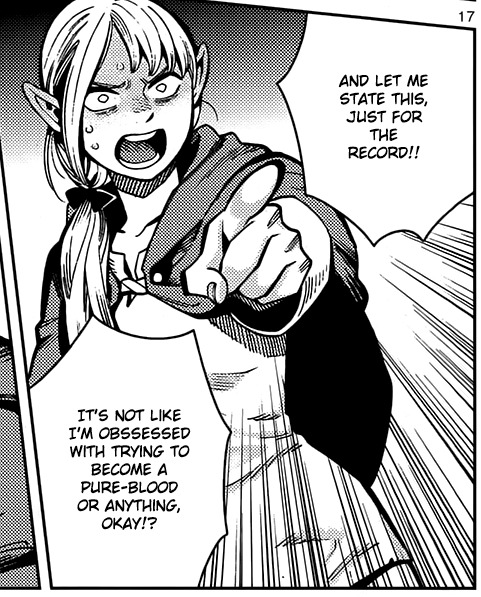
Yeah, yeah, "the lady doth protest too much," and all. But we know Marcille. We know that she's a lot more embarrassed and horrendously unconvincing when she's being prodded about something she's actually self-conscious about.
Moving onto the flipside of things, it might seem weird that she "pretends" to be a full elf around other races, but it's not really that strange if you think about it. Again, people are weird about her being infertile or whatever, and a lots of them don't even know much about what sets half-elves apart from everyone else. I mean, look at how uncomfortable Laios is just asking her about it
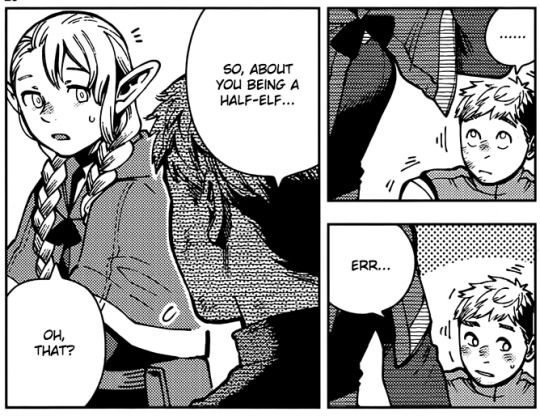
and look at how exasperated and resigned she looks
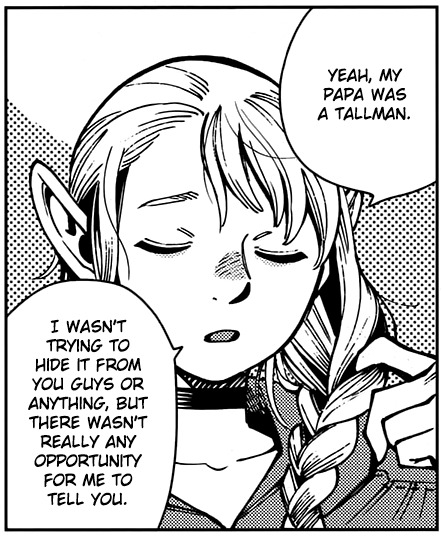
And like... she's right. Where would that come up in normal conversation? Why would she go out of her way to tell them? She's functionally a normal elf to other races anyway -- got the ears, the abnormally long "childhood", and the huge mana capacity. Unless it's directly relevant or important for people to know, I don't think it's all that strange or indicative of insecurity that she prefers not to bother with it.
(This combined with her sense of being an "outsider" to elf culture also explains why she thinks elf superiority is embarrassing. She sees the way elves treat short-lived races from the "outsider" perspective nonetheless, and thinks it's obnoxious; especially more so because she usually has to play the elf around short-lived races and deal with the reputation of arrogance that elves have built up.)
The sad thing is, this all means that... she doesn't actually fit in anywhere. She doesn't like going out West much because of how elves treat her. But she's also an outsider in the continents she was born in, treated like this exotic long-lived alien choosing to live among short-lived races for some reason. She is always an outsider, the Other, no matter where she goes. Add in the fact that she'll live longer than literally anyone she knows, and it's honestly kind of heartbreaking.
And I think that's the crux of it. Marcille really doesn't act like she's at all self-conscious about being a half-elf because of any feelings of inferiority or being half-made or whatever. She considers herself a perfectly legitimate being and might even, in some ways, consider herself superior to normal elves because she's not blind with elf supremacy or whatever. (And whatever "elven biases" she displays, all of them are born more out of the fact that she's kind of bad at conceptualizing how other races age and mature compared to herself, not that she actually considers herself better or more mature simply for being an elf.)
I think that whatever self-consciousness Marcille has about being a half-elf is, instead, related to terror and loneliness. The reminder that it ensures she'll never truly belong anywhere for the rest of her very long life. The reminder that, in truth, even she's not actually sure how old she is by other races' standards (hence the discomfort when asked how old she is). She doesn't want to not be a half elf, or be a full elf or full tall-man-- in her ideal world, she's still a half-elf. She just gets to live out her life at the same pace with the people she loves and doesn't have to say goodbye again and again and again until she dies.
and one last very important panel, right after Mithrun tells her that all her desires would be devoured
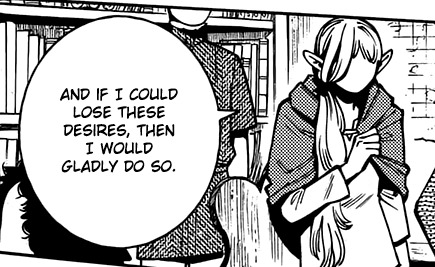
In her ideal world, she's still a half-elf and reality magically starts marching at her pace. But failing that, the second best thing is that she's still a half-elf-- but one who is able to accept reality and let go of her fear.
(But the rest of the story pans out the way it does because, to Marcille, taking reality apart and reshaping it was less scary than simply and fully reconciling with it.)
#asks#dungeon meshi manga spoilers#marcille donato#manga panel analysis#this is probably riddled with typos sorry#readmore cut bc it got long lmao#i ended up babbling about it bc it's such an important character detail to me#bc like... wow. she's so normal about it. she's literally just chilling.#the only thing that really bothers her is the material reality of it and how people treat her#the stereotypes the stigma etc. etc.#otherwise it just..#literally doesn't factor into her criteria for self-worth at all#the basic truth is that marcille likes herself on a fundamental level#she's not plagued by a deep and festering self-loathing the way a lot of characters in her archetype are#she likes herself and is proud of her successes and accomplishments#its just that shes terrified of failure and can have *episodes* of self-loathing when she fucks up#but who doesn't yknow#i know its a very slight nuance that makes very little difference in how her 'overachiever' problems manifest but its there#the sword of abandonment issues that hangs over her head has nothing to do with her self-worth or self-esteem or meeting her own standards#it has to do with the fear of not living up to *other* people's expectations and not being useful enough to be worth keeping around#she's good enough for herself but she's always so so so scared that she's not good enough for other people#i wont say much about what ryoko kui is saying using this as an allegory for real world racial biases but#dungeon meshi's treatment of marcille's relationship with her being half-elf is so incredibly important to me because it gets it so right.#a trauma about inferiority or being a half-being isn't inherent to the experience of being 'of two worlds' at all#that's something that's unfairly drilled into people by their environment#the *inherent* anguish is the loneliness. the constant longing. the fact that you are always homesick no matter where you are#always just a little bit of an outsider and never fully at home#and dungeon meshi gets that.#edit: cleaned it up a little
72 notes
·
View notes
Text
also i'm sick of people treating emotional eating as something that makes you pathetic
it's LITERALLY consensus that it's caused by poor emotional regulation (which is caused by trauma or disability most of the time) and issues related to trauma and it's often genetic (purely anecdotal but i literally come from an entire line of emotional eaters)
and also from the autistic and adhd community i feel like the only autistic/adhd comorbid person who COMPULSIVELY and EMOTIONALLY eats and everyone on tumblr seems to like. not do that. even though compulsive and emotional eating is more often associated with more severe presentations of adhd/more common in afaik low-middle and middle support autism presentations and autism that's frequently comorbid with intellectual disability so i guess you people don't wanna be like Those Autistics, which, somehow includes me!
#fatphobia for ts#(because let's be real the stigma against emotional eaters is fatphobia against fat people who meet stereotypes)#(or are fat for the Wrong Reasons instead of Acceptable Good Fatty Reasons)#and also#ableism for ts#because it's literally linked to symptoms of GASP! adhd autism bpd etc#adhd autism AND bpd all involve poor emotional regulation and cptsd does too#and my grandma likely had cptsd from being abused long term by her husband (and was already predisposed to emotional eating re: genetics)#and my mom not only has severe ocd but probably has untreated bpd as well AND was predisposed due to literal cptsd symptoms and genetics#(like she was CHRONICALLY abused both fatphobically DESPITE NOT BEING FAT AT THE TIME and otherwise by her parents)#and then there's me who was ALSO chronically abused by my grandfather had emotional dysregulation issues since ONE AND A HALF#and tbh have always had issues even telling if i was full unless i felt like vomiting which COULD be linked to autism#but no autistic person online says that's something that happens and autistics ALWAYS restrict or forget to eat (not me lmao)
2 notes
·
View notes
Text
still reading readymade heroine while in a defensive stance like. this is still surprisingly respectful and down to earth m/f with a gender nonconforming male lead. even the mc’s worries of ‘I don’t even know if he’s into women, he might be gay’ feels more reasonable than tokenizing or done specifically for comedic relief…?
#orlbs#misclb#I dunno it’s like#I don’t think this would ever be confirmed or a part of the manga#but it’s like. the atmosphere of a bi4bi m/f in terms of just being willing to accept certain things at face value#it’s like the only time where it’s like huh this feels like a gay way to worry about things despite being an m/f and without being annoying#y’know the whole ‘I don’t even know if the other person likes my gender’ question#but again because imo it feels like a natural line of questioning (even tho rooted in stereotypes)#it doesn’t have that aggravating self centered straight lens of ‘what if HETEROSEXUALS had to STRUGGLE like THE GAYS’ and it just feels more#normalized?#while still taking place in modern society with its stigmas etc#I don’t know how to describe it like it’s appealing (maybe even safe?) in ways m/f usually isn’t#because gender nonconformity OUTSIDE THE BOUNDS OF WHAT’S ACCEPTED is inherently framed in a sympathetic and positive light#like beyond a guy liking girly things which is still usually pretty good but still ‘safe’ within society#yknow????#basically this boils down to#even if it does inherently rely on stereotypes#this is the first time I’ve seen ‘he might be gay’ in an m/f in a way that’s 100% not homophobic#yknow???
16 notes
·
View notes
Text
My dear lgbt+ kids,
Someone requested some advice on whether to openly tell people you are mentally ill/neurodivergent/invisibly disabled or not.
There's some research that suggests that, for example, autistic people are more likely to identify as lgbt+ than their non-autistic peers - so this is absolutely a topic that belongs on a lgbt+ blog and I'm sure there are a lot of you who had to make that decision (and probably keep having to make it as coming-outs of any sort are rarely one-and-done!).
In fact, I had/have to make that decision myself! As an autistic person with depression and anxiety, I could tell you now why I personally decided to be open about all those diagnoses - but the right decision for me isn't necessarily the right decision for you as my life isn't yours.
So, what I'll do instead is to write down a general list with (potential) pros and cons, and I encourage you to nitpick it. Personalize it, take some time to decide how much, if at all, each point weighs in your own decision. There's no right or wrong answer here. It's all about your highly individual situation, about your safety and comfort.
Reasons not to be open about it:
It may put you at risk for various sorts of hate, discrimination, negative stigma and bad treatment
It may put a burden on you to educate others and discuss any misconceptions or myths they believe in, including potentially hurtful or disstressing ones (maybe even fruitlessly so which may cause frustrations or fights)
It may change the way people treat you, even in well-meant ways (babying you, pitying you, trying to "help" against your wishes etc.)
It may feel like a loss of privacy, make you feel "naked" or emotionally vulnerable, make you worry more about the way others perceive you etc.
Reasons to be open about it:
It may help others understand you or your behavior better, which may have positive effects on your relationships
It may allow you to ask for support and help more easily (either from friends and loved ones or in the workplace, school etc.)
It may make you feel empowered and help you accept/love yourself as a disabled person more
It may contribute to making your specific diagnosis more visible in society (which may also make you feel pride in breaking down stereotypes and supporting your community)
It may discourage people from assigning wrong or hurtful labels to you (either armchair-diagnosing you or labeling you as weird, crazy, lazy, gross etc.)
It's important to keep in mind that some people do not have the option to make this decision for themselves, for example because they have highly visible symptoms or they are in a position where their caretakers make the decision for them. This adds another layer to why we can't judge one decision as better or worse than the other - it's not always their own decision.
With all my love,
Your Tumblr Dad
1K notes
·
View notes
Text
In Defense of Feedism
I was absolutely struck when I read @fatliberation‘s beautiful, vulnerable post the other day. They always have brilliant ideas and they show unfailing grace and kindness to everyone, despite a ton of rude, ill-informed backlash (I would 100% recommend following them).
I can’t stop thinking about the reactions to that post and how incredibly strange it is to have to tiptoe around feedism (to use an umbrella term) in a movement that is supposed to be centered around ending the oppression of fat people.
I can understand why fat people who are not feedists would be weary or even repulsed by this kink. From the outside it may seem degrading and manipulative that the language and insults used against fat people are replicated in the bedroom. It is also harmful to be fetishized when you do not want to be fetishized, both in real life and online.
But these are the only points I’ve heard against feedism that I consider to be a legitimate argument in the discourse of fat liberation, as these are the only claims against feedism I’ve come across that are not based in fatphobia. If you are in favor of fat liberation, then you must see fatness as morally neutral. Therefore, the choice to gain weight is not inherently “good” or “bad,” it is instead a matter of autonomy– a right that should be granted to everyone, regardless of size.
The major issue with feedism is the same issue that permeates all kink and, by extension, all sexuality: consent. There are feedists, particularly feeders, who fetishize all fat people, regardless of their wishes; feedists who try to force fat people to participate in kink with or without their knowledge or permission. This is abhorrent behavior; there are no excuses for it. But the problem here is a violation of consent and not the kink itself. The unethical practice of kink does not make the kink unethical. And while feedees are often disregarded in discussions of feedism and fat liberation (which I have already talked about in depth here), there are most assuredly fat feedees, like myself, who are fully consenting to fat fetish play.
While I can only speak for myself, I know that I am not the only person who developed this kink because of weight-related trauma. When you grow up fat, when you are forced to go to Weight Watchers at seven years old, your brain comes to associate fat as taboo and taboo as sexy–but it goes beyond an attraction to something risky or frowned upon.
I live my life as a fat woman; I am fat at the doctor’s office and fat in tiny airplane seats and I am especially fat as a feedee. No matter if I’m engaging with my kink or not, I am fat and I don’t get to stop being fat outside of my bedroom. Out of all of the scenarios where I am existing in my fat body, engaging in kink play is the only one where I am experiencing pleasure because of my body, not despite it. It’s arousing to be praised for the thing that once made you hate yourself. It’s arousing to engage with something you fear or that has harmed you in a safe, controlled context where you have all the power to make it stop.
What anti-feedist fat liberationists need to understand is that feedism is, at its core, a resistance to fatphobia. When you see things that are typically fatphobic in feedist play– terms like “pig,” “cow,” “tubby,” etc. and comments about being “out of shape” or “ruined” by fat– it is not a replication of weight stigma, but a subversion of it. Feedism takes the harmful stereotypes of fatness and robs them of their power by putting them in a new context; a context where fatness is so desirable that feedists want more of it. By using the language and misconceptions of fatness to give and receive pleasure instead of to oppress, feedism not only creates a safe space to heal from fatphobic trauma, but it empowers fatness– it empowers fat people, which is supposed to be the goal of fat liberation.
810 notes
·
View notes
Text
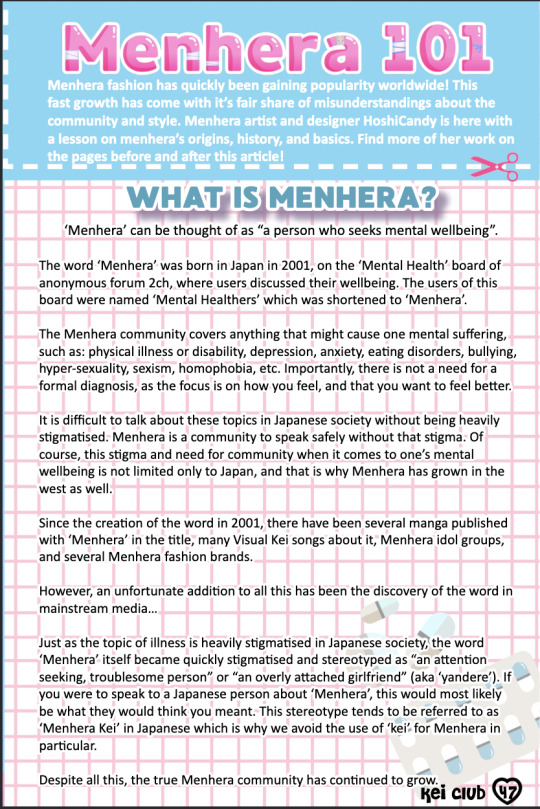
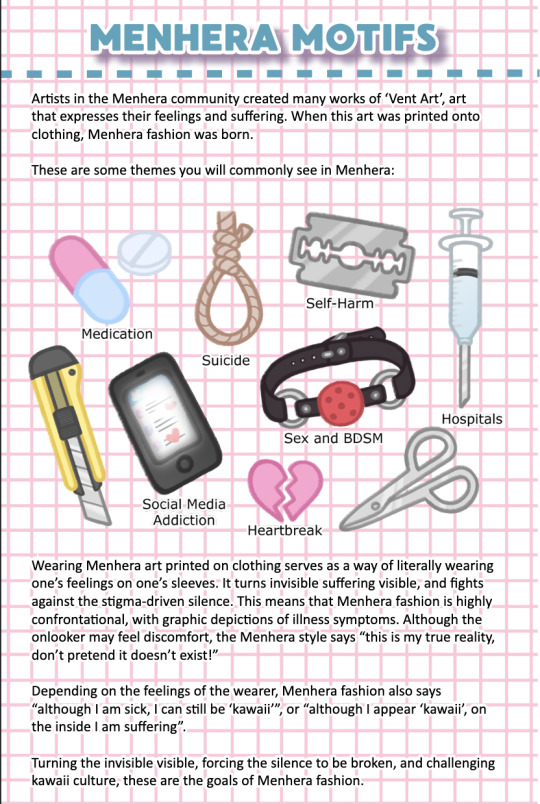
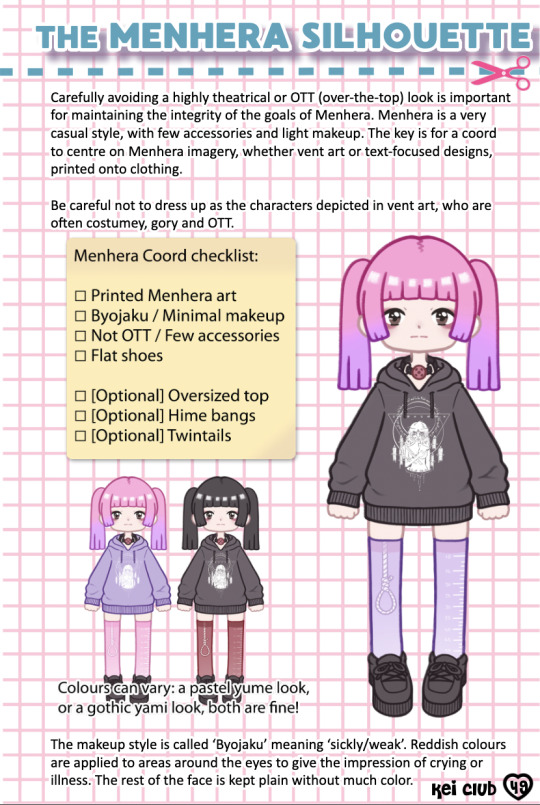

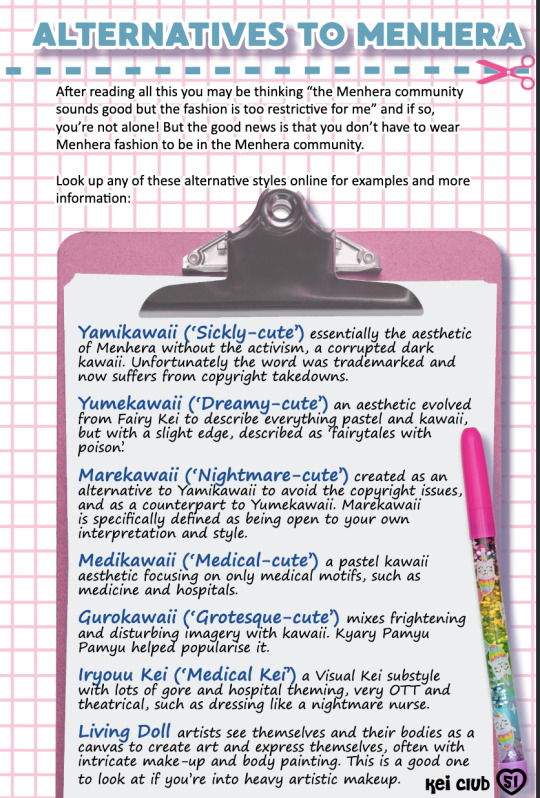
in case you haven't seen it yet, here's the menhera 101 article by HoshiCandy from Kei Club Issue 3. not sure if i'll post the other menhera related articles from this issue or not, so consider checking the link in source if you're interested.
i'm also leaving a text transcription under the cut for anyone that may benefit from that
Menhera 101
Menhera fashion has quickly been gaining popularity worldwide! This fast growth has come with its fair share of misunderstandings about the community and style. Menhera artist and designer HoshiCandy is here with a lesson on menhera’s origins, history, and basics. Find more of her work on the pages before and after this article!
What is Menhera?
“Menhera” can be thought of as “a person who seeks mental wellbeing”.
The word “Menhera” was born in Japan in 2001, on the “Mental Health” board of anonymous forum 2ch, where users discussed their wellbeing. The users of this board were named “Mental Healthers” which was shortened to “Menhera”.
The Menhera community covers anything that might cause one mental suffering, such as: physical illness or disability, depression, anxiety, eating disorders, bullying, hyper-sexuality, sexism, homophobia, etc. Importantly, there is no need for a formal diagnosis, as the focus is on how you feel, and that you want to feel better.
It is difficult to talk about these topics in Japanese society without being heavily stigmatized. Menhera is a community to speak safely without that stigma. Of course, this stigma and need for community when it comes to one’s mental wellbeing is not limited to Japan, and that is why menhera has grown in the west as well.
Since the creation of the word in 2001, there have been several manga published with “Menhera” in the title, many Visual Kei songs about it, Menhera idol groups, and several menhera fashion brands.
However, an unfortunate addition to all this has been the discovery of the word in mainstream media...
Just as the topic of illness is heavily stigmatized in Japanese society, the word “Menhera” itself became quickly stigmatized and stereotyped as “an attention seeking, troublesome person” or “an overly attached girlfriend” (aka “yandere”). If you were to speak to a Japanese person about “Menhera”, this would most likely be what they would think you meant. This stereotype tends to be referred to as “Menhera Kei” in Japanese which is why we avoid the use of “kei” for Menhera in particular.
Despite all this, the true menhera community has continued to grow.
Menhera Motifs
Artists in the Menhera community created many works of “Vent Art” art that expresses their feelings and suffering. When this art was printed onto clothing, Menhera fashion was born.
These are some themes you will commonly see in Menhera:
Medication
Suicide
Self-harm
Hospitals
Sex and BDSM
Social Media Addiction
Heartbreak
Wearing Menhera art printed on clothing serves as a way of literally wearing one’s feelings on one’s sleeves. It turns invisible suffering visible, and fights against the stigma driven silence. This means that Menhera fashion is highly confrontational, with graphic depictions of illness symptoms. Although the onlooker may feel discomfort, the Menhera style says “this is my true reality, don’t pretend it doesn’t exist!”
Depending on the feelings of the wearer, Menhera fashion also says “although I am sick, I can still be ‘kawaii’” or “although I appear ‘kawaii’, on the inside I am suffering”.
Turning the invisible visible, forcing the silence to be broken, and challenging kawaii culture, these are the goals of Menhera fashion.
The Menhera Silhouette
Carefully avoiding a highly theatrical or OTT (over-the-top) look is important for maintaining the integrity of the goals of menhera. Menhera is a very casual style, with few accessories and light makeup. The key is for a coord to centre on Menhera imagery, whether vent art or text-focused designs, printed onto clothing.
Be careful not to dress up as the characters depicted in vent art, who are often costumey, gory, and OTT.
Menhera Coord checklist:
Printed Menhera art
Byojaku/Minimal makeup
Not OTT/Few accessories
Flat Shoes
[optional] Oversized top
[optional] Hime bangs
[optional] twintails
Colors can vary: a pastel yume look, or a gothic yami look, both are fine!
The makeup style is called “Byojaku” meaning “sickly/weak”. Reddish colors are applied to areas around the eyes to give the impression of crying or illness. The rest of the face is kept plain without much color.
A Note of Caution
The Menhera community is about healing, and seeking recovery and wellbeing. It advocates getting help, medication, therapy, and receiving support through your recovery journey.
True Menhera never encourages or enables harmful behaviors, and never glorifies them. Menhera fashion is an alternative way of expressing your suffering without self-harm. Menhera fashion empowers the individual through their recovery, but does not empower harmful behaviors.
There are some, sometimes labeled by the community as “Wannabe Menhera”, who mistook the meaning of “menhera” after seeing its rise in popularity, as it being trendy to fake mental illness. They engage in behaviors such as posting self-harm photos (real or faked) to social media with the tag #menhera, and other attention-seeking behaviors.
While this is the opposite of what the Menhera community stands for, is harmful to the unfortunate viewers of these photos, and creates further stigma against the community...it cannot be ignored that these “Wannabe Menhera”, too, need help and healing.
The Menhera fashion movement is to help you feel comfortable, unashamed, and kawaii in your skin, scars and all. It is NOT for encouraging people to create new scars “for the aesthetic”.
If you are struggling with mental or physical suffering, thoughts, or behaviors that cause harm to yourself or others, please seek help. If you do not believe you deserve help, you do, please seek help. If you believe you are faking it, you likely are not, your feelings are valid, please seek help.
Don’t have access to therapy?
We found a comprehensive list of suicide prevention hotlines at https://ibpf.org/resource/list-international-suicide-hotlines [link no longer working]
There are also free and affordable counseling services online like Better Help and Pride Counseling! Look online to find what option could work for you!
Alternatives to Menhera
After reading all this you may be thinking “the Menhera community sounds good but all the fashion is too restrictive for me” and if so, you’re not alone! But the good news is that you don’t have to wear Menhera fashion to be in the Menhera community.
Look up any of these alternative styles online for examples and more information:
Yamikawaii (“Sickly-cute”) is essentially the aesthetic of Menhera without the activism, a corrupted dark kawaii. Unfortunately the word was trademarked and now suffers from copyright takedowns.
Yumekawaii (“Dreamy-cute”) an aesthetic evolved from Fairy kei to describe everything pastel and kawaii, but with a slight edge, described as “fairytales with poison”.
Marekawaii (“Nightmare-cute”) created as an alternative to Yamikawaii to avoid the copyright issues, and as a counterpart to Yumekawaii. Marekawaii is specifically defined as being open to your own interpretation and style.
Medikawaii (“Medical-cute”) a pastel kawaii aesthetic focusing only on medical motifs, such as medicine and hospitals.
Gurokawaii (“Grotesque-cute”) mixes frightening and disturbing imagery with kawaii. Kyary Pamyu Pamyu helped popularize it.
Iryouu Kei (“Medical Kei”) a Visual Kei substyle with lots of gore and hospital theming, very OTT and theatrical, such as dressing like a nightmare nurse.
Living Doll artists see themselves and their bodies as a canvas to create art and express themselves, often with intricate makeup and body painting. This is a good one to look at if you’re into heavy artistic makeup.
886 notes
·
View notes
Text
i love now vulcans are unintentionally autistic coded
they’re supposedly emotionless aliens, when in fact they experience emotion much more intensely than humans (they express it differently)
they’re widely misunderstood creatures, with a whole lot of stigma and stereotypes surrounding them
they have periods of time where their emotions and bodies are completely out of control—for wildly different reasons than autistic people, but i still find the results (embarrassment, being treated as taboo, etc..) to be somewhat similar to meltdowns
they have extremely sensitive hands, and avoid using them when they can (sensory issues)
they can sense the emotions of those around them very easily and tend to get extremely overwhelmed by it (hyper empathy)
they don’t understand sarcasm, and tend to take everything very literally
and so so so much more
hdgfhdjjd spock my love <33 and all my other beloved vulcans i love them an unhealthy amount 😔
#autistic#autism#neurodivergent#actually autistic#autistic coded#autistic coded character#star trek#star trek tos#jim kirk#james t kirk#captain kirk#admiral kirk#spock#s’chn t’gai spock#commander spock#captain spock#mr spock#vulcans#vulcan#the original series#sarek#s'chn t'gai sarek#ambassador sarek#spirk#tos spirk#aos#star trek aos
321 notes
·
View notes
Text
(Tw for talk of r/fakedisordercringe, ableism, fake claiming, harassment, etc.)
I have had it with r/fakedisordercringe. This subreddit is filled with content that is both ableist and harmful to the neurodivergent community. The posts mock autistic people, systems, people with ADHD, etc. suggesting that people are faking or exaggerating their symptoms for attention. First of all, it's incredibly harmful to assume that someone is faking a disorder just because they don't fit into your narrow view of what that disorder looks like. Autism, for example, is a spectrum disorder, which means that there are a wide variety of ways that it can present itself. Just because someone doesn't exhibit all of the classic symptoms that you associate with autism doesn't mean that they're faking it. (Tell me you're an aspie supremacist without telling me you're an aspie supremacist /hj)
The reasoning that the users of this subreddit often use tend to fall under these categories:
"They don't experience *insert disability* the same way that I do, so they must be faking"
"They post too frequently about their disability, so they must be faking"
"They support self diagnosis, so they must be faking"
"They use xenogenders/neopronouns, so they must be faking"
etc.
Has it ever crossed your mind that maybe not everyone is the same? That not everybody's disability is the same? /nbh
The idea that someone can determine whether or not another person is truly autistic or has a mental disorder based on a few online interactions (or even just a post!) is absurd. Not every autistic person or people with other disorders fits the stereotype of what people expect, and it's not up to strangers on the internet to decide who is "legitimate" and who is not.
As an autistic person, I'm tired of constantly having to defend myself and my experiences. I'm tired of seeing people with disabilities being reduced to nothing more than punchlines for jokes.
A few days ago someone in a youtube comment section accused me of faking being autistic, by saying something along the lines of "Self diagnosed ahh". First off, not everybody can safely access diagnosis. You are so incredibly privileged if you think everyone can. Somebody being undiagnosed does NOT immediately mean they are faking. Second off, I am literally professionally diagnosed.
I am tired of r/fakedisordercringe and the hate, misinformation, and stigma it perpetuates.
Leave disabled people ALONE.
#tw fakedisordercringe#tw ableism#tw fakeclaiming#actually autistic#pro self dx#rant#neurodivergent#nonspeaking autistic#autism#aac user#nonspeaking#disabled#disability
793 notes
·
View notes
Text



sebowan au stuff 🕺💃🕺💃
modern-ish vamp/vamp hunter au where vampire hunters are a government sanctioned association that are in charge of...well hunting vampires but there is HEAVY stigma and misconception around vampires cuz since ancient times in history vampires have always been deemed bloodthirsty killers given their natural abilities to kill with more ease and thus vampires have been threatened death by law since—while there ARE still serial killer/human-feeding vampires like the stereotype (which is how rowan got turned) there are lots of turned vampires living in hiding (them being vampires I mean) since the law is still consistently being upheld by those stereotypes (which themselves are upheld by the few extremes).
To get animal blood there are certain sellers/stores used by most non-human-feeding vampires en masse in secret and spread by word of mouth, with certain secret phrases used to indicate that you're a vampire looking to buy animal blood. They typically come in boxes 📦 & in the boxes are many plastic packs of animal blood so people can store them for a while in their homes & not have to go back to buy blood too often.
Vampires that feed on humans are more like the stereotypical "allergic to sun + crucifixes etc." vampires whereas vampires who drink mostly animal blood are more like humans, just that they can only quell their hunger with blood. Human-feeding vampires also can't digest human food and have to throw up it up while vampires that drink animal blood can still consume human food, just that it doesn't make them full. OH also to become turned a vampire has to drink all the blood out of the human, killing them, then give them their own blood. Then they wake up as a vampire 🧛♂️🧛♀️
Vampire hunters usually work in squadrons assigned to certain districts/areas. Within a district certain squadrons are assigned to certain areas. (ASS trio are in a squadron together!!!) In order to become a vampire hunter you need a license, and there are different ranks in the hunter association. Lower ranking hunters are assigned to lower ranking jobs while higher ranking hunters give out the assignments & take higher ranking jobs. (Job rank is decided by level of danger.) Each district has its own vampire hunter department establishment with a head chief.
#my art#eon babbles#farmer rowan#vamp/vamp hunter au#comic#stardew valley#sdv#sdv oc#sdv fanart#stardew valley fanart#stardew valley oc#stardew valley sebastian#sdv sebastian#sebastian sdv#stardew sebastian#sebastian x farmer
97 notes
·
View notes
Note
What advice/resources would you recommend for someone who is trying to decentralize her life from men (or really anybody other than herself)?
Any books/videos/advice/etc. that you have would be great!
Thanks! Your blog helps me so much xo
Hi love! I'm so glad to hear this <3. Sharing some tips/resources below. Hope this helps xx
How To Decenter Men In Your Life:
Consider the values, goals, and desired lifestyle that feel most authentic to you if social scripts/stigmas didn't apply to you
Take time to become radically honest with your desires as an individual – outside of the perception of men, your family, boss, teachers, peers, etc.
Cultivate a sense of personhood and identity established in your interests, hobbies, skillsets, learning capabilities, creativity, and desire for growth in all aspects of life
Act in your own best interests. Speak up for your needs, and advocate for yourself. Be more "selfish." Don't apologize for what you want and go after it. Act in your own best interests
Become confident in negotiating, assertive communication, and standing on your own two feet. Establish relationships in all aspects that are based on mutual benefit and equitable exchange
Unlearn your self-sacrificing & people-pleasing. Stop shrinking yourself or suppressing your needs to make others feel better or more comfortable
Validate yourself: your needs, desires, goals, dreams, preferences, and opinions. You need to choose yourself every day. Your appeal to others means nothing if you don't like the person you are or are becoming to satisfy the needs or desires of others
Consider the ways you're consciously and subconsciously confining your self-expression and belief system to fit the mold/appease the patriarchy. Actively work to deconstruct this mentality and way of being
Be honest with yourself about how men enrich your life. Not the other way around. Do they fulfill you romantically, sexually, both, or neither? There's no right or wrong answer, except the one that requires you to put on a performance rather than live in alignment with your true self
TikTok Creators:
Melanie Hamlett (LOVE her! My favorite creator/author on this topic.)
Katie Jgin
Soberside
Rose Hackman
Hope Peddler
Therese Lee (@thereselee6)
SpirtualWhistleBlower
Books On Decentering Men:
A Single Revolution by Shani Silver
Patriarchy Stress Disorder: The Invisible Inner Barrier to Women's Happiness and Fulfillment by Valerie Rein, Ph.D
What a Time to Be Alone: The Slumflower's Guide to Why You Are Already Enough by Chidera Eggerue
All the Single Ladies: Unmarried Women and the Rise of an Independent Nation by Rebecca Traister
Enjoy Your Solo By Mary Delia Allen
How to Be Single and Happy by Jennifer Taitz
Singled Out: How Singles Are Stereotyped, Stigmatized, and Ignored, and Still Live Happily Ever After by Bella DePaulo, Ph.D
On Our Best Behavior: The Seven Deadly Sins and the Price Women Pay to Be Good by Elise Loehnen
We Are Not Born Submissive: How Patriarchy Shapes Women's Lives by Manon Garcia
The Seven Necessary Sins for Women and Girls by Mona Eltahawy
Down Girl: The Logic of Misogyny by Kate Manne
Why Does He Do That?: Inside the Minds of Angry and Controlling Men by Lundy Bancroft
Men Who Hate Women: From Incels to Pickup Artists: The Truth about Extreme Misogyny and How it Affects Us All by Laura Bates
Fed Up: Emotional Labor, Women, and the Way Forward by Gemma Hartley
#decentering men#intersectional feminism#feminism#feminist#women empowerment#womens rights#intersectionality#social justice#patriarchy#purity culture#female gaze#female excellence#female power#female writers#it girl#femme fatale#female sexuality#the feminine urge#queen energy#high value woman#internalized shame#girl advice#personal growth#femmefatalevibe#women's rights#gender norms#female rage#feminist theory#book rec list#womanism
281 notes
·
View notes
Text
Its funny how people talk about classism and working class rep in RTD1 but casually say they're happy Martha wasn't working class bc 'it would've been bad representation' in the same breath. Yh, there's a lot of damaging hood stereotypes out there but being working class whilst Black doesn't automatically make the character bad. We're not problematic just for existing. If anything, Martha being a working-class Black woman becoming a doctor would've been even more groundbreaking, especially bc the average Black Brit is working-class or below. Even Freema Agyeman herself grew up on a council estate. That could've been really inspirational. The idea that UK discrimination ignores race and only focuses on class is false especially if u look at how the Windrush were treated because they were working class AND Black/of colour (Tory party appealing to white working classes with anti-immigrant rhetoric, Sikh and Muslim workers making their own unions bc they were excluded, West Indians being denied rent etc.). RTD fans love to create a split where Rose's working class rep and Martha's Black rep exist in boxes that don't ever touch but they do. I've seen so many 'but Martha's middle class so I couldn't relate to her' which is funny bc apart from ignoring all the Black fans that couldn't relate to most characters in the show anyway, a lot of us still related to Rose. South and East London are have huge multiracial and multicultural working class communities. We deserve to be represented too. We exist. Working class isn't a synonym for white.
It just says a lot how much RTD and Rose are gassed for destigmatising working class characters but it would've been sooo bad if those characters were Black lol. 'Chav' and 'roadman' have become removed from their OG meanings and are now aesthetics and trends but the actual people living their lives are still living the stigma. You lot love 'chavs' as in cute y2k fits on a conventionally attractive white woman but lord forbid a hypothetical Black person that's unemployed, broke and speaking Black Brit Vernacular getting that doccy who screentime bc that's a bit too ghetto™ apparently. It also says u lot have limited imagination. Attack the Block and The Kitchen proved Black working-class characters can exist in sci-fi and if we're gonna go there... they're doing more for working-class rep rn than RTD1 almost 2 decades ago.
Martha could've walked around in a northface jacket with half a tub of eco styler on her head and she still would've been great idc!
#you lot don't deserve hood martha!#martha jones#rose tyler#rtd era#classism#fandom antiblackness#fandom racism
64 notes
·
View notes
Text
I hate how much that autism has become a joke recently. "omg I'm so autistic 🤪" when they literally just do something a bit out of the ordinary. But in reality autism isn't that at all, especially for me. For me it's sensory issues, missing social cues, overstimulation, sensitivity, stimming, echolalia, auditory processing issues, having difficulty making and maintaining friends, etc. stop making real disorders a little joke, you are contributing to the harmful stereotypes and stigma.
#actually autistic#autism#autistic adult#disability rights#disabled#young and disabled#disability#auditory processing disorder#echolalia#sensory issues
50 notes
·
View notes
Text
Maybe More People Are Arospec (Part 3)

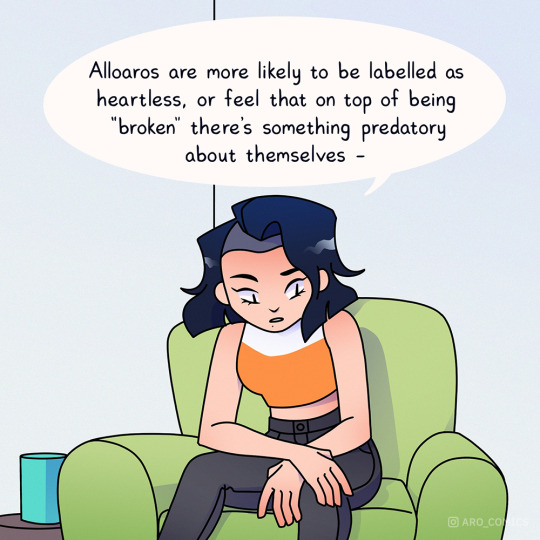
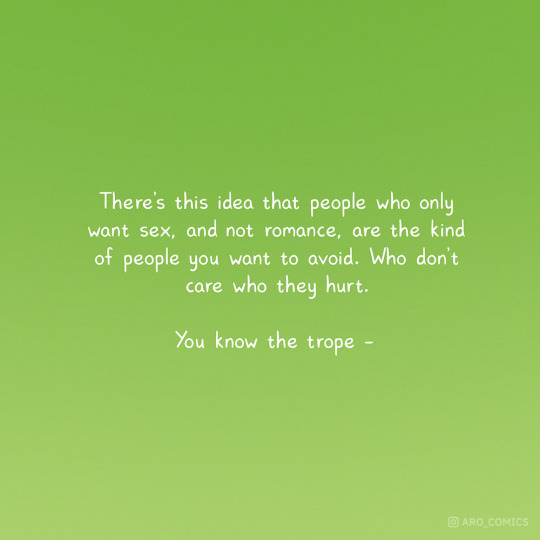
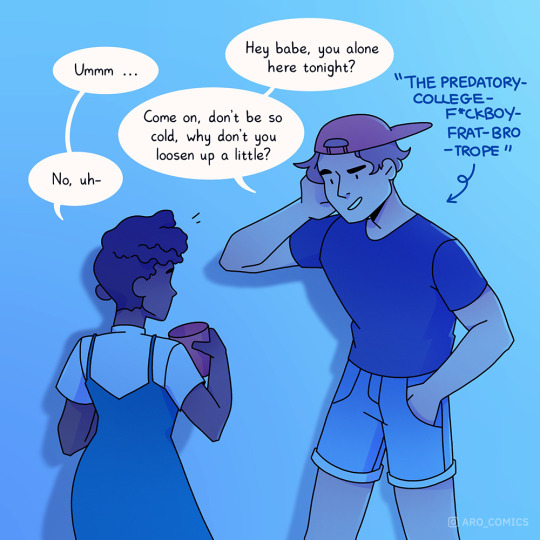
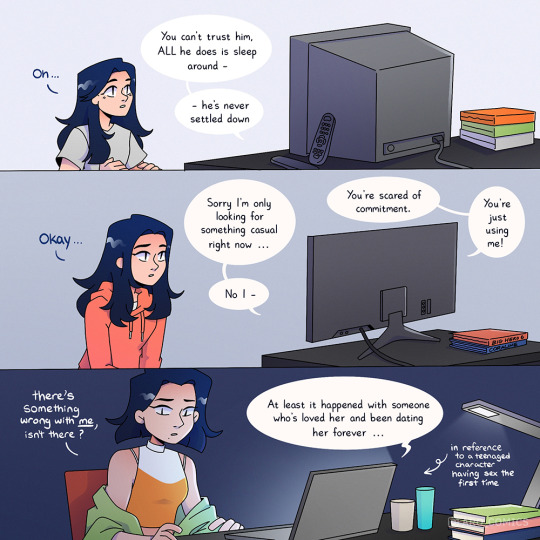
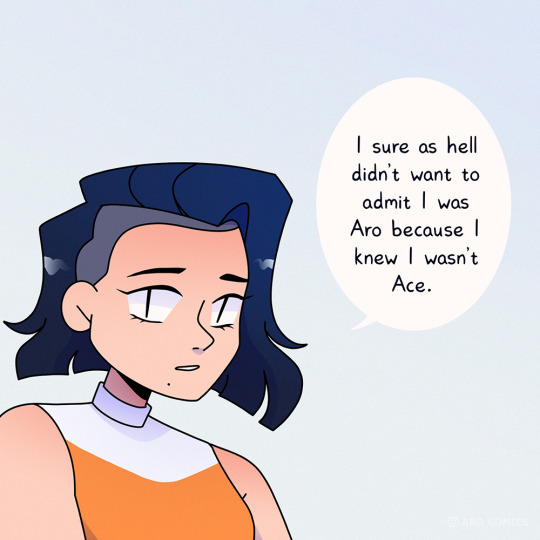
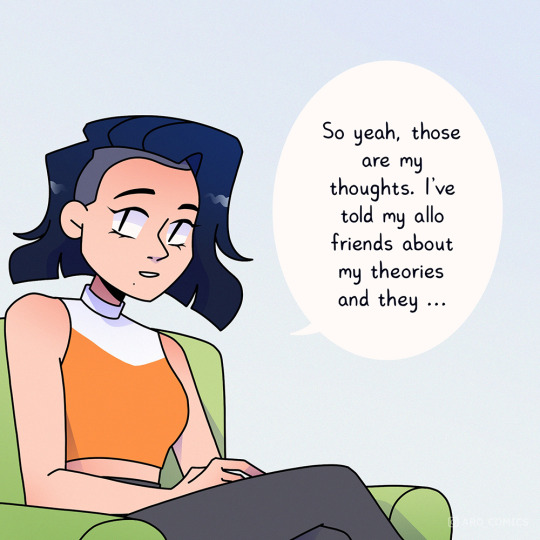

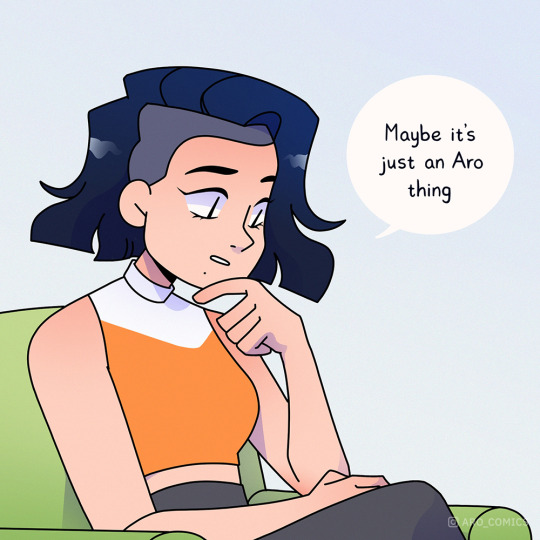
Maybe More People Are Arospec, 3/3 - The Alloaro Edition, in which we cover some alloaro specific (negative) tropes that I personally believe is the reason why there are so few people who identify as alloaro 🙃
I both have everything and nothing to say on this one, because the topic at hand hits home harder than I want to admit 😔. I think it's important to acknowledge the harm that constantly enforcing these ideas about sex without romance as being inherently emotionally drainining, a sign of emotional immaturity, or predatory, etc. probably damages the self-perception and self-worth of most alloaros greatly. Of course,:I understand that NOT ALL highlighted are inherently related to being alloaro - but the way these ideas are framed, especially in the split panel, imply sex without romance is the root of the problem, which in reality it is not. A lack of communication, respect for other's boundaries, or being flat out a predator is the actual issue here.
Anyway, I do understand the intersection of different issues that lead to the ideas that I referenced in the comic (elaborated more in the comments). I suppose the solution, as usual, is more education and more nuance surrounding the discussion 😅😉
I'm so glad to finally have this last part of the series up! I hope you enjoyed the ride, and for sure let me know if there's anything else that I haven't covered here you think also keeps people from realizing that they're aromantic 💚💚💚
[Image Description:
Slide 1: Celia sits on a green armchair in a living room. "Actually, let's make this take even more spicy - maybe a lot more people are alloaro in particular."
Slide 2: She looks down. "Alloaros are more likely to be labelled as heartless, or feel that on top of being 'broken' there's something predatory about themselves -"
Slide 3: "There's this idea that people who only want sex, and not romance, are the kind of people you want to avoid. Who don't care who they hurt. You know the trope - "
Slide 4: An illustrated example of the stereotypical trope. Shown is a house party where two characters are interacting. A taller man leans over a clearly intimidated woman:
"Hey Babe, you alone here tonight?"
"Umm …"
"Come on, don't be so cold, why don't you loosen up a little?"
"No, uh-"
An arrow points to the man that says ""the predatory-college-fuckboy-frat-bro-trope"
Slide 5: Another series of examples, this time illustrated from Celia's childhood. The panel is split into three as you progress through the years. In each section Celia watches a television show.
1: "You can't trust him, ALL he does is sleep around - he's never settled down"
2: "Sorry I'm only looking for something casual right now …"
"You're scared of commitment"
"No, I-"
"You're just using me!"
3: "At least it happened with someone who's loved her and been dating her forever", this is in reference to a teenaged character having sex the first time.
In this last section celia says, forlorn, "There's something wrong with ME, isn't there?"
Slide 6: Celia speaks to viewer directly. "I sure as hell didn't want to admit I was Aro because I knew I wasn't Ace."
Slide 7: "So yeah, those are my thoughts. I've told my allo friends about my theories and they …"
Slide 8: "… didn't exactly believe me." Celia is shown video chatting with her friend, saying "So those are my theories as to why romantic attraction is probably less common than we think, and why there's probably way more Aro people! People are probably too embarassed to admit it because stigma or never even realized it!"
Friend awkwardly says "I … I'm sorry I gotta say I don't agree …"
Slide 9: Celia holds her finger up to her chin, pondering. "Maybe it's just an Aro thing."]
2K notes
·
View notes
Note
No response on the "biphobia" thing? I still think the idea is bullshit.
I gotta be honest, the way you (or someone else sending asks in the same vein?) worded the question in the past was kind of...interesting. Would have required a lot more disagreement being written out while walking a fine line. I'm too lazy!
I think there's a perfectly obvious and reasonable argument for the unique experience of bisexuality coming with its own equally unique problems worth solving (whether those "things worth solving" are BIG or more trivial). Creating language for that is an inevitable next step
It's the issue being labeled and other implications. Does this pretend that homosexuality is some kind of privilege? What about het- attraction, bisexual or heterosexual? Does it ignore the massive influence that a LACK of het- attraction has on any discussion of human sexuality? How is it engaging with the idea of bias vs. stigma vs. systemic abuse vs. stereotypes?
I see bad discourse on the topic, but I see a lot of bad discourse about a lot. I wrote plenty here lolol. Tbh I also feel uninformed just enough to prefer listening to others who bring stats, history, etc. on both "sides" of the arguing that happens
36 notes
·
View notes
Text
We're doing an assignment on DID at the moment: it's a mostly visual task. We're planning on creating a (hypothetical) mental health campaign aimed towards lowering the stigma around DID/OSDD as we've faced some real shit at the hands of DID stereotypes
Just wanted to ask some other systems what they associate with DID? Colours, symbols, designs, etc
And if anyone has anything they wish non systems knew about being a system, that too!
Thanks everyone!
(reblogs appreciated for a bigger sample size)
#posted by 🔥#did#osdd did#osddid#osdd#osdd system#did system#system talk#sys tag#sys talk#did osdd#actually dissociative#endos dni#🐚 drafted this and didn't post it lol
41 notes
·
View notes
Text
i really don’t think it’s helpful when discussing biphobia to say things like “are bi women oppressed for liking men?” it just feels like purposeful phrasing to make biphobia sound silly or invalid. it’s not that women are oppressed for liking men or vice versa, it’s that there is a lot of stigma around bisexuality *specifically*. it’s not just that they like the same gender, but that their sexuality is not confined to one. it blurs the line between gay and straight (despite the fact that it is it’s own sexuality apart from het/gay).
the thing is, heteronormativity tries to draw solid distinctions between “us” and “them”. but bisexuals often exist in either or both spaces, and so they were/are demonized because bisexuality was seen as a ploy to tempt, manipulate or lead astray the Good Heterosexuals. you see this particularly with bi women, as they experience the intersection of biphobia with misogyny. bi women were (and are) accused of “sexual deviance,” homewrecking, cheating and manipulating men for their own benefit. bisexuals are often associated with greed, promiscuity (going against conservative values), lying, self-absorption and heartlessness, and with new discourses arising in leftist & queer spaces over the last decade, more harmful stereotypes have been fabricated and promoted (i.e. bisexuality is transphobic/enbyphobic, rigid, outdated, etc). so are bi women oppressed for liking men? i think the fallacy is in the premise of the question. what answer are you really looking for when you ask?
67 notes
·
View notes